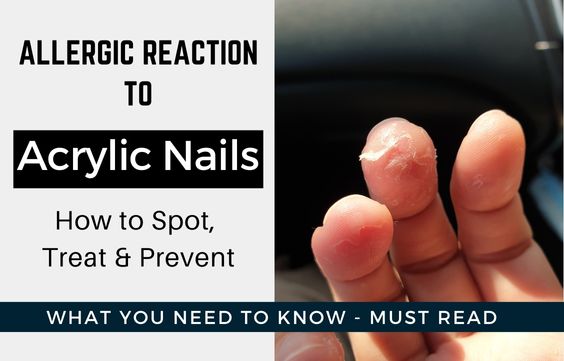Allergic Reaction to Acrylic Nails- How to Spot & Treat

Acrylic nails are one of the most popular forms of manicures available, with millions of women and even some men getting acrylic applications done every month.
But can someone be allergic to them or even develop an allergy or sensitivity toward them?
Can You Be Allergic to Acrylic Nails
Yes, you can be allergic to acrylic nails, and even if you don’t have an allergy you can develop one.
That’s why in this article I am going to share with you some tips on:
- How to spot an allergic reaction to acrylic nails
- How to treat an allergic reaction to acrylic
- How to prevent becoming allergic to acrylic nails
Now it’s important to note that I am not a doctor so if you have a very bad reaction I highly recommend seeing a medical expert.
Related Articles:
How Acrylic Ruin Your Nails & Tips to Prevent Damages
Why do Acrylic Nails Hurt & Easy Tips to Relieve the Pain
Symptoms of An Allergic Reaction to Acrylic Nails
The main signs that you have an allergy or that you are sensitive to acrylic nails are:
- Swelling of the finger– especially around the nails and fingertips
- Rash– appearing on your fingers.
- Burning especially on the nail plate and nail bed.
- Itching– a mild or intense itch on your fingers
- Redness– around the nail area and/or fingertips
- Dryness and Peeling of the skin around the nails and fingertips
Now even if you do have one of these symptoms doesn’t necessarily mean you are allergic to acrylic nails. These symptoms could also be an indicator of;
- An Infection can cause most of the symptoms such as itching and swelling
- An Expired acrylic product was used which can cause irritation
- A harsh nail primer was applied that you are not accustomed to which can cause burning especially if it got on your skin.
- Rough application or Over filing of the nails can also cause soreness and some amount of swelling.
To accurately diagnose an acrylic allergy you would need to visit a dermatologist or if you notice that you are constantly getting these symptoms after every acrylic application.
Related Articles –
Dangers & Effects of Acrylic Nails- Can it Cause Cancer
Click here to understand what it means if your acrylic nails turn yellow or brown.
How to Treat an Allergic Reaction to Acrylic Nails
1- Have them Removed
If you have symptoms of allergic reaction to acrylic nails the first thing you need to do is have them removed as soon as possible.
If you don’t remove them it can get worst. And even if the symptoms are from an infection or bad product you would still need to have them removed.
Once the acrylic nails have been removed the symptoms should start to disappear.
Related Articles:
When to Remove Acrylic Nails & When to Get it Filled
How to Easily Remove Acrylic Nails Without Acetone
2- Get Medical Help
If your symptoms are not getting better meaning they are staying the same way or getting worse even after removing the acrylic nails you will need to seek medical attention so that they can prescribe treatments.
Related Article – 7 Tips to Quickly Heal Damaged Nails After Acrylic Or Gel
3- Over the Counter Topical Treatment
A pharmacist can recommend using certain creams that contain drugs such as Hydrocortisone which can help to relieve any itching and treat rashes from an allergic reaction.
Also, calamine lotion and antihistamine products are commonly used. But I recommend talking to a medical expert before trying any topical treatment. Citation.
Related Article: Gel vs Acrylic Nails – Which One Is Right For You
How long will an Allergic Reaction to Acrylic Nails Last
The duration of the reaction will vary with every individual based on how sensitive they are and how serious the reaction was.
But once the acrylic nails were removed your nails should start to recover from the reaction within a few days.
Any burning and pain should ease within a few hours and the rash should start to fade.
Related Article – Best Odorless Monomers- Pros, Cons, Is it Safer & Better
When Will Symptoms of an Allergic Reaction to Acrylic Nails Show
When these symptoms show up will vary with every individual. They can show up during the application process or a few hours or even a few days after.
This really depends on how sensitive you are to the acrylic monomer.
I have seen clients whose skin and nails would start burning and itching during the application process. And I have had clients who reported a few hours after getting their nails done that they developed a rash.
Can you develop a sudden allergy to acrylic nails?
Yes, you can over time develop a reaction or sensitivity toward acrylic nails which can appear suddenly.
This is because most reactions to acrylic nails are classified as Irritant Contact dermatitis. This is where your skin becomes sensitive to things like chemicals usually from repeated exposure.
Most individuals develop contact dermatitis towards the acrylic liquid monomer and not necessarily to the powder or beads themselves.
Related Article – Acrylic Overlays: Cost, How to DIY, How Long will they Last
How to Prevent Becoming Allergic to Acrylic Nails
1 – Reduce how often you get acrylic nails done
One of the best things you can do to prevent developing sensitivity towards acrylic nails is to reduce how often you get them.
I always recommend taking breaks for 2-3 weeks after getting your acrylic removed. Now during the break, you can use regular nail polish.
By taking breaks and reducing how often you get acrylic nails prevents your skin and nails from becoming sensitive to all the chemicals used.
Related Article – What is Acrylic Monomer- Best Brands to Use & Side Effects
2- Avoid Getting Any of the Acrylic Liquid onto your skin
As mentioned before the development of contact dermatitis from acrylic nails comes from repeated exposure to acrylic liquid on your skin.
This can happen when the nail tech makes the beads too wet and allow the liquid monomer to go on your skin or if the brush accidentally touches your skin.
So ensure your nail tech is experienced and knows to make good beads with the right ratio of powder to liquid and is accurate and using the right brush to avoid any of the liquid going onto your skin.
Related Article – Why you can’t Substitute Liquid Monomer with Acrylic nails
3- Apply vaseline over your cuticles
Another way you can prevent acrylic liquid from going onto your skin is to apply a light coat of vaseline on the skin around your nails.
The Vaseline will act as a barrier and prevent the monomer from getting to the skin. Just don’t apply the vaseline onto the nails this will make the acrylic not adhere well. Citation.
4- Avoid MMA Products
Acrylic products that contain MMA also known as Methyl Methacrylate have a higher rate of causing allergic reactions. Instead, your acrylic liquid should be made with EMA.
So check your labels and ask your nail tech if they use MMA acrylic products. One way to spot MMA products is that they usually have a very intense fruity scent.
5- Wash Your Hands After Getting Your Nails Done
Always wash your hands and fingers with soap and water after getting an acrylic manicure. This helps to wash away any acrylic product that may have gotten on your skin.
6- Wear Gloves if you are applying the acrylic onto someone else
Nail technicians need to wear nitrile gloves when working with acrylic products. The gloves will help protect themselves from becoming sensitive to the acrylic product.
So if you are applying acrylic nails onto someone, protect yourself by wearing gloves.
Did you know that you can also have Acrylic Toenails & Pedicures -click here to learn more.
7- Use Alternatives
Acrylic nails are not the only way to get great manicures you do have other options. But the caveat is that most other alternatives such as nail polish or gel nails also contain acrylic-based ingredients.
Now, these are a few options that are perfect if you are allergic or sensitive to acrylic nails:
- Press-on Nails – most brands of press on nails don’t contain acrylic-based ingredients. Instead, they are made of plastic and use nail glue to paste onto your nails. Click here to see Press on Nails Vs Acrylic Nails.
- Nail Stickers & Wraps – are usually made of vinyl and should be very safe if you are allergic to acrylic nails. Click here to learn more about nail stickers.
- Henna Nails – uses an all-natural dye to coat your nails. You can click here to learn more about Henna Dyes for Nails
I have an entire article that goes through some of the best Alternatives to Acrylic Nails. But not all of the are recommended if you are allergic to acrylic products.
You can also check out my article – 5 Healthiest & Safest Manicures that Won’t Damage Your Nails
Can an acrylic allergy go away?
There have been no official studies to indicate if contact dermatitis or allergies to acrylic can go away. But there have been cases where other types of allergies do disappear.
But from my experience, once your skin has developed a sensitivity towards acrylic products it won’t go away so easily.
Related Articles:
